
Herbert Jeffrey Hancock is an American jazz musician, bandleader, and composer. Hancock started his career with trumpeter Donald Byrd's group. He shortly thereafter joined the Miles Davis Quintet, where he helped to redefine the role of a jazz rhythm section and was one of the primary architects of the post-bop sound. In the 1970s, Hancock experimented with jazz fusion, funk, and electro styles, using a wide array of synthesizers and electronics. It was during this period that he released perhaps his best-known and most influential album, Head Hunters.

William Otis Laswell is an American bass guitarist, record producer, and record label owner. He has been involved in thousands of recordings with many collaborators from all over the world. His music draws from funk, world music, jazz, dub, and ambient styles.
Praxis is an experimental rock project, led by producer/bassist Bill Laswell and featuring guitarist Buckethead and drummer Brain in nearly every incarnation of the band.
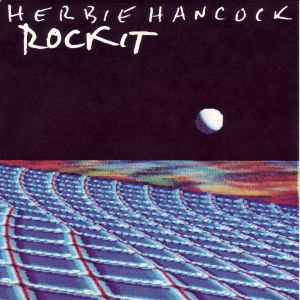
"Rockit" is a composition recorded by American jazz pianist Herbie Hancock and produced by Bill Laswell and Michael Beinhorn. Hancock released it as a single from his studio album Future Shock (1983). The selection was composed by Hancock, Laswell, and Beinhorn.

Material was an American band formed in 1979 and operating until 1999, led by producer and bassist Bill Laswell.
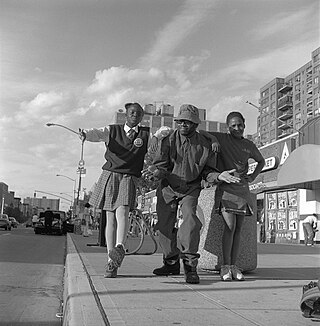
Derek Showard, better known by the stage name GrandMixer DXT, is an American musician, and the first DJ to use the turntable as a musical instrument.
Ejigayehu Shibabaw, known by her stage name Gigi, is an Ethiopian singer. She has performed the music of Ethiopia in combination with a wide variety of other genres, often in collaboration with her former husband Bill Laswell, a bassist and producer.
Michael Beinhorn is a North American record producer, composer, author, and musician. He has produced albums for Red Hot Chili Peppers, Soundgarden, Hole, Korn, and Marilyn Manson.
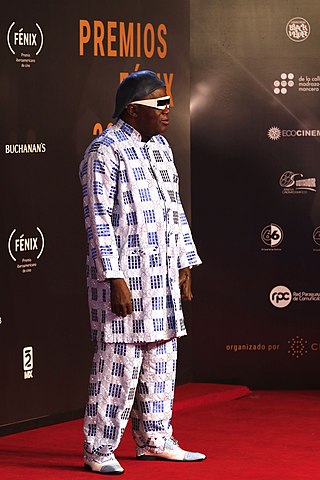
Foday Musa Suso is a Gambian musician and composer. He is a member of the Mandinka ethnic group, and is a griot. Griots are the oral historians and musicians of the Mandingo people who live in several west African nations. Griots are a living library for the community providing history, entertainment, and wisdom while playing and singing their songs. It is an extensive verbal and musical heritage that can only be passed down within a griot family.
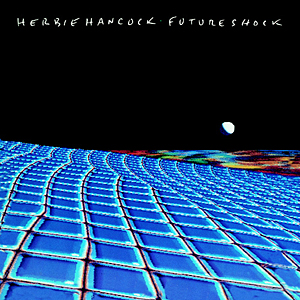
Future Shock is the twenty-ninth album by American jazz pianist Herbie Hancock, released in August 1983 by Columbia Records. It was his first release from his electro-funk era and an early example of instrumental hip hop. Participating musicians include bass guitarist Bill Laswell, guitarist Pete Cosey and drummer Sly Dunbar.

Sound-System is the thirtieth album by jazz pianist Herbie Hancock and the second of three albums co-produced by Bill Laswell with the ‘Rockit’ Band. Guest artists include saxophonist Wayne Shorter, guitarist Henry Kaiser, kora player/percussionist Foday Musa Suso and drummer Anton Fier.
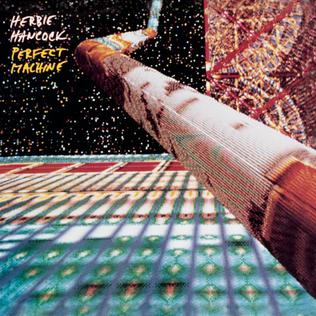
Perfect Machine is the thirty-second album by jazz pianist Herbie Hancock. It was the third and final album in Hancock’s series co-produced by Bill Laswell. Guests include bassist Bootsy Collins.

One Night with Blue Note is a 1985 feature length jazz film directed by John Charles Jopson.

Village Life is an album by jazz pianist Herbie Hancock and Mandinka griot Foday Musa Suso. It was recorded in Japan and released in 1985. Hancock and Suso had worked together as part of a larger ensemble for Hancock's 1984 album Sound-System, and Village Life was recorded shortly after a world tour. There are no overdubs, Village Life was recorded live in the studio. The album was coproduced by Bill Laswell.

Transmutation Live is a live album by experimental rock band Praxis, recorded during a performance in Zurich, Switzerland, in the summer of 1996.

Scratch is the soundtrack to the 2001 documentary Scratch directed by Doug Pray. Scratch examines cultural and historical perspectives on the birth and evolution of hip-hop disc jockeys (DJs), scratching and turntablism and includes interviews with some of hip-hop's most famous and respected DJs.
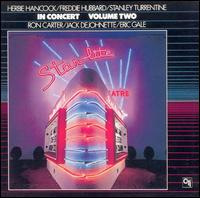
In Concert Volume Two is a live album recorded in 1973 by jazz trumpeter Freddie Hubbard, pianist Herbie Hancock and tenor saxophonist Stanley Turrentine. It was recorded in Chicago and Detroit for Creed Taylor's CTI label and features performances by Hubbard, Turrentine, Hancock, guitarist Eric Gale, bassist Ron Carter and drummer Jack DeJohnette.

Blow-Up is a soundtrack album by American jazz pianist Herbie Hancock, featuring music composed for Michelangelo Antonioni's 1966 film Blowup. MGM Records released the album in the United States on 20 February 1967, and in the United Kingdom on 10 May. The album features performances by Hancock, trumpeters Freddie Hubbard and Joe Newman, alto saxophonist Phil Woods, tenor saxophonist Joe Henderson, guitarist Jim Hall, bassist Ron Carter and drummer Jack DeJohnette. Although Jimmy Smith is credited with playing organ on the album, some sources claim it was actually Paul Griffin who was at the sessions.

Directions is a compilation album by American jazz musician Miles Davis, released in 1981 by Columbia Records. It collects previously unreleased outtakes that Davis recorded between 1960 and 1970. Directions was the last of a series of compilation albums—mostly consisting of, at that time, previously unreleased music—that Columbia released to bridge Davis' recording hiatus that ended with the Man with the Horn in July 1981.
Imani Uzuri is an American vocalist and composer.















